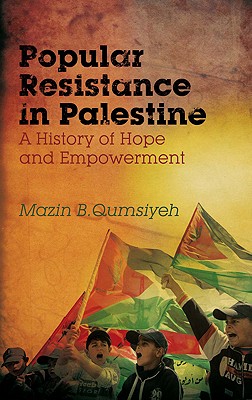 The Western media paint Palestinian resistance against Israeli occupation as exclusively violent: armed resistance, suicide bombings, and rocket attacks. In reality these methods are the exception to what is a peaceful and creative resistance movement. In this fascinating book, Dr Mazin Qumsiyeh synthesizes data from hundreds of original sources to provide the most comprehensive study of civil resistance in Palestine. The book contains hundreds of stories of the heroic and highly innovative methods of resistance employed by the Palestinians over more than 100 years. The author also analyzes the successes, failures, missed opportunities and challenges facing ordinary Palestinians as they struggle for freedom against incredible odds. This is the only book to critically and comparatively study the uprisings of 1920-21, 1929, 1936-9, 1970s, 1987-1991 and 2000-2006. The compelling human stories told in this book will inspire people of all faiths and political backgrounds to chart a better and more informed direction for a future of peace with justice.
The Western media paint Palestinian resistance against Israeli occupation as exclusively violent: armed resistance, suicide bombings, and rocket attacks. In reality these methods are the exception to what is a peaceful and creative resistance movement. In this fascinating book, Dr Mazin Qumsiyeh synthesizes data from hundreds of original sources to provide the most comprehensive study of civil resistance in Palestine. The book contains hundreds of stories of the heroic and highly innovative methods of resistance employed by the Palestinians over more than 100 years. The author also analyzes the successes, failures, missed opportunities and challenges facing ordinary Palestinians as they struggle for freedom against incredible odds. This is the only book to critically and comparatively study the uprisings of 1920-21, 1929, 1936-9, 1970s, 1987-1991 and 2000-2006. The compelling human stories told in this book will inspire people of all faiths and political backgrounds to chart a better and more informed direction for a future of peace with justice.Lynn says:
"Before even completing the first chapter in Qumsiyeh's book, I had to stop and breathe a sigh of tremendous relief and gratitude that here at last was a book that not only helped to explain what I've ached to understand since a long-ago ('79) visit to Israel, but did so in a way in alignment with the values of Gandhi, M.L. King, Jr. and other historical figures who have attempted to bring about nonviolent change when faced with state-sanctioned oppression. The narrative I was accustomed to when working on a kibbutz in Israel in '79 was the one espoused by Michener in Exodus; that of the Jewish diaspora, pregnant with noble ideals to guide a besieged people. "Facts on the ground" in travels from Jerusalem to the Lebanese border differed dramatically from what I'd expected and I was introduced to a labyrinth of conflicting narratives that I've been de-tangling to this day.
Popular Resistance in Palestine chronicles in great detail the resistance efforts in Palestine dating back to Ottoman rule and parses out hundreds of instances where economic and military might vs. right played out in the gradual takeover in what for decades has been a apartheid state.
The quotation opening chapter 7 (on the great revolt of 1936-39)is one that one hears quite frequently these days as uprisings occur in Tunisia, Egypt, Libya and the American midwest:
"Those who make peaceful revolution impossible, make violent revolution inevitable."
-John F. Kennedy
The multitude of uprisings described in the book make clear that the suicide bomber is not the accurate face to put on the typical Palestinian. This is a people that has drawn upon a vast reservoir of courage and creativity to survive through an ethnic cleansing that manages to inflict incredible damage in an unabashed land-grab that has been facilitated by compliant media silence and mythology, and through violence.
Qumsiyeh highlights many turning points where peaceful resistance measures were conducted
with often, yet not always, impeccable discipline and decency by everyday Palestinians as well as their leaders, painting an entirely different picture of the Palestinian people than that painted for us over the years by mainstream media.
For anyone seriously wanting to grasp the realities on the ground in the Middle East,
this book's analysis is a vital contribution to the historical record."
No comments:
Post a Comment